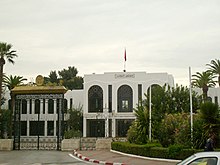
Back سياسة تونس Arabic Палітыка Туніса Byelorussian Държавно устройство на Тунис Bulgarian Politisches System Tunesiens German Gobierno y política de Túnez Spanish Politique en Tunisie French פוליטיקה של תוניסיה HE Politica della Tunisia Italian ტუნისის პოლიტიკური სისტემა Georgian Politik Tunisia Malay
 |
|---|
|
|
|
|

The politics of Tunisia takes place within the framework of a unitary semi-presidential representative democratic republic,[1] with a president serving as head of state, prime minister as head of government, a unicameral legislature and a court system influenced by French civil law. Between 1956 and 2011, Tunisia operated as a de facto one-party state, with politics dominated by the secular Constitutional Democratic Rally (RCD) under former presidents Habib Bourguiba and then Zine el Abidine Ben Ali. However, in 2011 a national uprising led to the ousting of Ben Ali and the dismantling of the RCD, paving the way for a multi-party democracy. October 2014 saw the first democratic parliamentary elections since the 2011 revolution, resulting in a win by the secularist Nidaa Tounes party with 85 seats in the 217-member assembly.[2]
Tunisia is a member of the Arab League, the African Union and the Organization of Islamic Cooperation. It maintains close relations with the United States, France and the European Union, with which it entered an Association Agreement in 1995.[3] Tunisia's favorable relations with the United States and the European Union were earned following years of successful economic cooperation in the private sector and infrastructure modernization.[4]
The Economist Intelligence Unit rated Tunisia a "hybrid regime" in 2022.[5]
Tunisia's first democratically elected president, Beji Caid Essebsi, died in July 2019. After him, Kais Saied became Tunisia's president after a landslide victory in the 2019 Tunisian presidential elections in October 2019. He had a reputation of not being corruptible.[6] However, on 25 July 2021 he suspended Parliament, fired the prime minister and consolidated power in what opponents called a "coup."[7]
- ^ Choudhry, Sujit; Stacey, Richard (2014) "Semi-presidential government in Tunisia and Egypt". International Institute for Democracy and Electoral Assistance. Retrieved 7 January 2016.
- ^ "Secularist Nidaa Tounes party wins Tunisia election" BBC, 2014
- ^ European Union Association Agreement, Ministry of Development and International Cooperation, 2009.
- ^ "Tunisian Partnership with Europe" Defense Technical Information Center, 2004
- ^ "Democracy Index 2022: Frontline democracy and the battle for Ukraine" (PDF). Economist Intelligence Unit. 2023. Retrieved 2023-02-09.
- ^ "Tunisia election: Kais Saied to become president". BBC News. 14 October 2019.
- ^ Vivian Yee (21 September 2021). "Tunisian President Appoints Prime Minister Amid Protests Over Power Grab". The New York Times. ISSN 0362-4331. Wikidata Q108837495.
© MMXXIII Rich X Search. We shall prevail. All rights reserved. Rich X Search